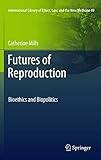Futures of Reproduction [electronic resource] : Bioethics and Biopolitics / by Catherine Mills.
Series: International Library of Ethics, Law, and the New Medicine ; 49Publisher: Dordrecht : Springer Netherlands : Imprint: Springer, 2011Edition: 1Description: X, 134 p. online resourceContent type:- text
- computer
- online resource
- 9789400714274
- 170 23
- BJ1-1725
 eBooks
eBooks
1. Introduction Disability, Gender and Selective Termination Liberal Eugenics What is biopolitics? -- 2. Normal life: liberal eugenics, value pluralism and normalisation Introduction Shaping People: human enhancement and normality What is normalisation? The vitality of social norms Conclusion.- 3. Reproductive autonomy as self-making Introduction The presumptive priority of reproductive liberty Enacting freedom: the ethical practice of reproductive autonomy Conclusion -- 4. The limits of reproductive autonomy: prenatal testing, harm and disability Introduction Disability, harm and the non-identity problem The expressivist critique of prenatal testing: a defense Conclusion -- 5. Reproducing alterity: ethical subjectivity and genetic screening Introduction Genetic selection and ethical self-understanding Natality, corporeality, singularity Screening singularity Conclusion -- 6. Ultrasound, embodiment and abortion Introduction Ultrasound images and the sympathetic imagination The social production of sympathy: biopolitical reproduction The ethical demand of embodied appearance: relationality and responsibility Conclusion.-7. Final Remarks.
Issues in reproductive ethics, such as the capacity of parents to ‘choose children’, present challenges to philosophical ideas of freedom, responsibility and harm. This book responds to these challenges by proposing a new framework for thinking about the ethics of reproduction that emphasizes the ways that social norms affect decisions about who is born. The book provides clear and thorough discussions of some of the dominant problems in reproductive ethics - human enhancement and the notion of the normal, reproductive liberty and procreative beneficence, the principle of harm and discrimination against disability - while also proposing new ways of addressing these. The author draws upon the work of Michel Foucault, especially his discussions of biopolitics and norms, and later work on ethics, alongside feminist theorists of embodiment to argue for a new bioethics that is responsive to social norms, human vulnerability and the relational context of freedom and responsibility. This is done through compelling discussions of new technologies and practices, including the debate on liberal eugenics and human enhancement, the deliberate selection of disabilities, PGD and obstetric ultrasound.


